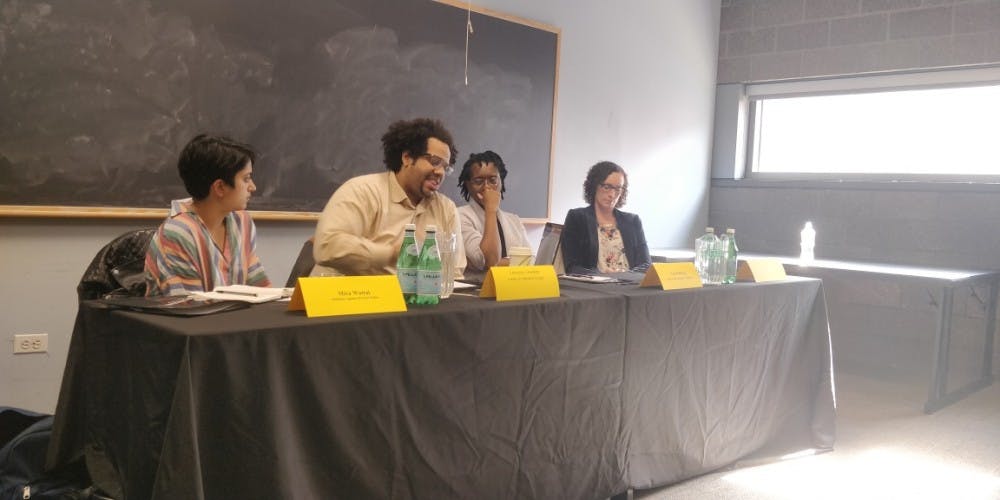The University’s Program in Racism, Immigration and Citizenship hosted a panel titled, “‘Living Hopkins’ Roundtable: Policing in Baltimore” on Thursday, March 14.
Tara Huffman, director of the Criminal and Juvenile Justice Program at the Open Society Institute in Baltimore; Lawrence Grandpre, director of research at Leaders of a Beautiful Struggle; and Mira Wattal, a member of Students Against Private Police (SAPP), were featured as panelists. Bloomberg Distinguished Associate Professor of Political Science and Sociology Vesla Weaver moderated the panel.
The panelists focused their discussion on the University’s push for a private police force and current legislation that would grant Hopkins the authority to establish it.
Huffman opened the panel by exploring concerns about the proposed Hopkins police force. She believes that police officers have biases that may disproportionately harm people of color.
“All of us probably know law enforcement officers that don’t seem to fit the category of the racist abusive police officer, but it’s important that when we are talking about policing we don’t focus on individual police and instead focus on the institution that is policing,” Huffman said.
She explained that it is difficult for individual police oficers to enact change within their profession.
“You can be a good person wearing a police uniform who joined the force for good reasons, but there is a culture and there are policies and there are expectations that influence the way you do your job,” she said.
Huffman said that despite instances of racial profiling, some members of black communities believe that police will create a more safe environment.
“The black community has had a schizophrenic relationship with the police because, on the one hand, we have had the failure of so many other institutions that we think that we have to call the police and that the police are there to keep us safe, and we want to see our tax dollars at work too,” she said.
According to Huffman, because Baltimore is the largest city in the state of Maryland, many people in authority think that heavily policing the city will improve the city’s future.
Wattal, who was speaking on behalf of SAPP, expressed her frustration with the administration’s response to community input on the private police bill.
“I just feel like community members and students were structurally shut out from the legislative process from the very beginning,” she said.
Grandpre, from Leaders of a Beautiful Struggle, a grassroots think-tank dedicated to the public policy interest of black people in Baltimore, transitioned the conversation away from policing and toward the mental health reasons behind high crime rates in the city.
“Black men are far less likely to commit suicide but are far more likely to die of homicide. What if some of what we’re calling violent homicide is internalized self-hatred and a desire to die? Think about how that conceptually flips this idea of the super predator to someone who is in intense pain,” he said.
He believes that perceptions of masculinity play a role in the high homicide rate as well.
“To choose yourself is seen as some type of violation of the code of honor and masculinity. But to die being shot by an enemy or shot by the cops is something honorable,” he said.
Junior Rose Ole-Kuyan felt that the panel was informative but wished there was more representation from local leaders.
“I found the panel to be interesting, but I was upset that there weren’t more local community leaders from people in perimeter communities talking about how it would affect them,” she said.
Ole-Kuyan was ultimately glad she came, however, because she felt that private policing will disproportionately affect students of color at Hopkins.
“I came to this event because I really wanted to go to with the Black Student Union to Annapolis but unfortunately, my schedule didn’t work [out],” she said. “I thought this was another event I could do instead to support the cause, because if it does affect any type of student the most, it would be black students.”
Rima Hussein, a PhD candidate in Philosophy, was skeptical of the University’s provisions for implicit bias training in the policing bill. According to Hussein, who stated that she has done work in this field, there is data that suggests that the police trainings Hopkins intends to use are not an efficient way of dealing with implicit bias.
“It’s shameful that Hopkins doesn’t listen to their own researchers in determining what’s good for the country and what’s good for this campus,” she said.
Hussein was also surprised by the fact that Hopkins is continuing to push the bill through the Maryland General Assembly despite community pushback.
“The situation is much more dire than I thought. It’s really kind of surprising to me that people, after all these years of repeating again and again that private police are prone to abuses of power, still think that it’s a useful thing to get a private police force on this campus,” she said.





